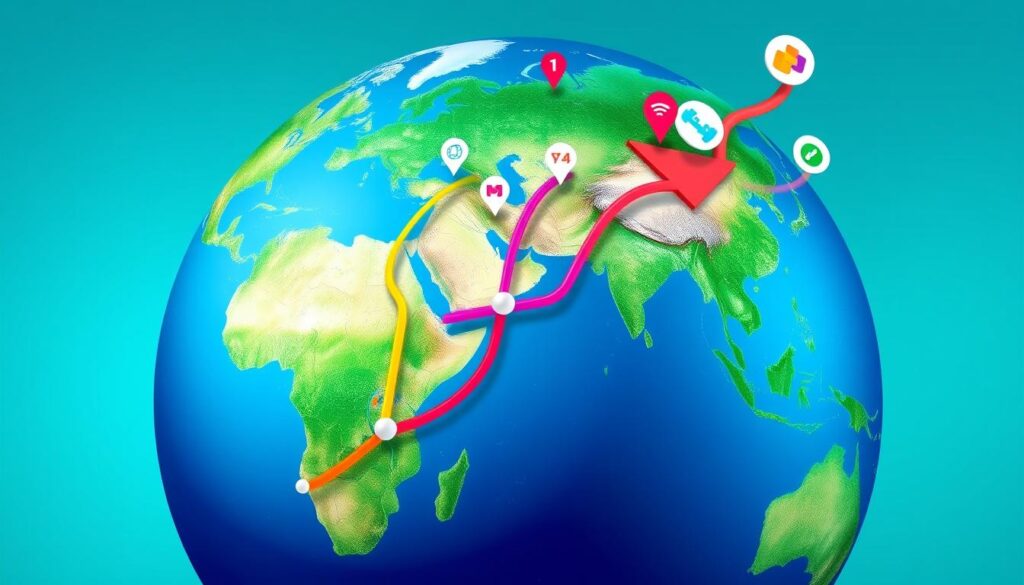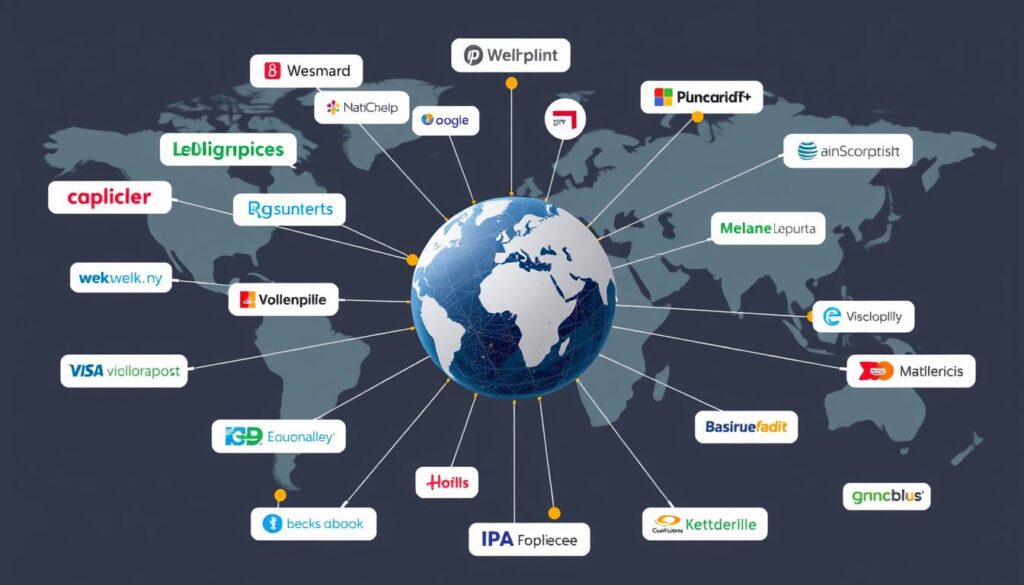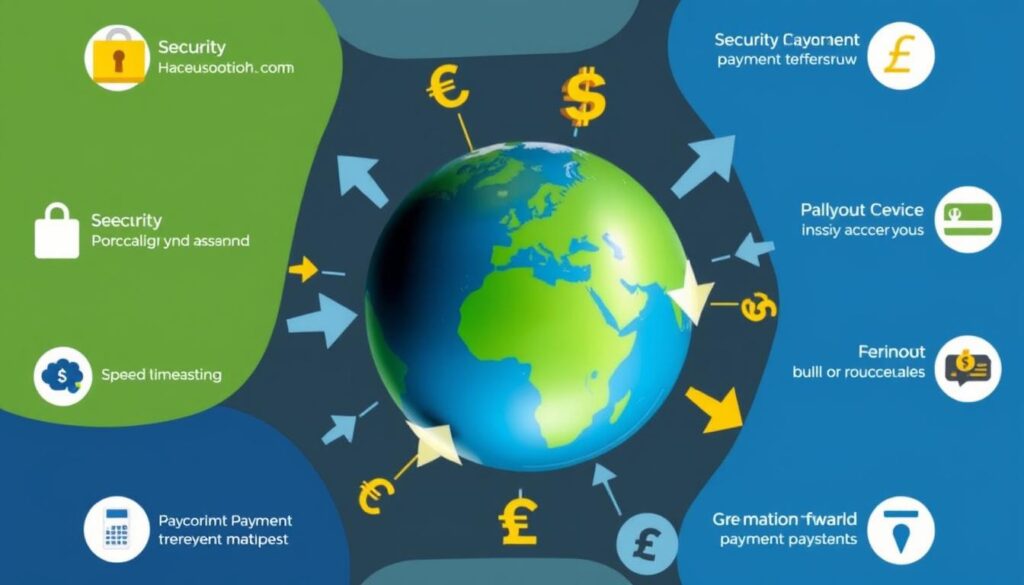By 2030, the payment gateway market will hit a huge $106.4 billion USD. This shows how crucial cross-border payments are in today’s global e-commerce. When your business goes international, picking the Best Payment Gateways for International Transactions and avoiding lost sales.
Choosing the right international payment gateway can be tough, but it’s vital. You need to think about things like supporting many currencies, offering local payment options, and keeping transactions secure. This guide will walk you through the best payment gateways for global transactions. It will help you find the perfect match for your business.
Key Takeaways
- Discover the top payment gateways for global business, including features, fees, and security capabilities.
- Learn how to evaluate international payment gateways based on factors like multi-currency support, ease of integration, and fraud protection.
- Understand the importance of compliance and regulations for cross-border payments, and how to ensure your payment gateway meets local requirements.
- Explore strategies for maintaining high authorization rates and reducing checkout abandonment for international customers.
- Gain insights into handling payment failures and recurring billing for your global customer base.
What is an International Payment Gateway?
An international payment gateway helps businesses take payments from customers worldwide. It makes transactions secure and efficient across different currencies. It also supports various local payment methods and follows laws in each market.
Definition and Explanation of International Payment Gateways
A payment gateway acts as a middleman for online transactions. It lets customers and merchants transfer funds securely. International payment gateways add more features for global businesses.
They support many currencies, convert currencies on the fly, and work with many local payment options. This makes it easier for businesses to work with customers from other countries.
Importance of International Payment Gateways for Global Businesses
- They help businesses reach customers worldwide by handling transactions in many currencies.
- They make shopping easier by offering local payment options, which can lower the chance of customers leaving their carts.
- They make sure businesses follow the rules of different places, like PCI DSS and GDPR.
- They give businesses useful data on transactions, which can help make better decisions.
- They help manage money better by making payments fast and efficient.
Today, international payment gateways are key for businesses wanting to grow globally. They make it easier to handle payments across borders. This helps companies succeed in the global online market.

Top International Payment Gateway Providers
Businesses have many top international payment gateway providers to pick from. PayPal, Stripe, and Worldpay are leading options. They offer great features for handling payments across borders.
PayPal
PayPal is a trusted payment gateway in over 200 countries and supports 25 currencies. It’s a favorite for businesses wanting to accept top international payment gateway providers and best payment gateways for global transactions. PayPal charges 1.9% for payments over $10 and 2.4% for less than $10.
Stripe
Stripe uses APIs for payment gateways, making it easy to add and supports over 135 currencies. It’s a top choice for leading payment processors for cross-border payments. Stripe’s fees start at 2.9% plus 30 cents per transaction, with no ongoing fees.
Worldpay
Worldpay is an all-in-one payment processor for over 120 currencies. It’s great for businesses wanting to accept international payments. With advanced fraud protection and 24/7 support, it’s a dependable choice for global transactions. Worldpay’s fees depend on the package and features chosen.
| Payment Gateway | Transaction Fees | Supported Currencies | Key Features |
|---|---|---|---|
| PayPal | 1.9% for payments over $10, 2.4% for transactions under $10 | 25 currencies | Trusted, widespread platform with large user base |
| Stripe | 2.9% plus 30 cents per transaction | 135+ currencies | API-driven integration, extensive local payment method support |
| Worldpay | Varies based on package and features | 120+ currencies | All-in-one payment processor, advanced fraud protection, 24/7 support |
When choosing an international payment gateway, businesses should look at several things. These include multi-currency support, local payment method availability, ease of integration, security, and customer service. This ensures a smooth and secure way to handle global payments.

Factors to Consider When Choosing an International Payment Gateway
Choosing the right international payment gateway is key for your global business. You need to think about multi-currency support, local payment methods, ease of integration, and security. Each factor is crucial for smooth transactions and happy customers worldwide.
Multi-Currency Support and Local Payment Methods
Accepting payments in local currencies and through preferred methods boosts your sales. Find a gateway that supports many currencies and works with local payment options. This includes bank transfers, e-wallets, and mobile payments.
Ease of Integration and User Experience
Your payment gateway should work well with your systems and offer a smooth checkout. Check the provider’s API, tools, and support for easy integration. A user-friendly design also helps make customers happy.
Security, Fraud Protection, and Compliance
Security is a must for cross-border payments. Look for a gateway with strong security, fraud prevention, and PCI-DSS compliance. It should also have fraud detection and mitigation to protect your business and customers.
| Feature | Importance |
|---|---|
| Multi-Currency Support | Enables you to accept payments in the local currencies preferred by your international customers, improving conversion rates. |
| Local Payment Methods | Integrating with popular local payment options, such as bank transfers, e-wallets, and mobile payments, can increase customer trust and satisfaction. |
| Ease of Integration | A seamless integration process and user-friendly interface ensure a smooth checkout experience for your customers. |
| Security and Fraud Protection | Robust security measures and advanced fraud prevention tools safeguard your business and customers against financial losses and reputational damage. |
| Regulatory Compliance | Adherence to relevant laws and regulations, such as PCI-DSS, ensures your payment processing is secure and compliant. |
Think about these factors to pick an international payment gateway that fits your business. It should offer a smooth experience, security, and meet legal standards for your global transactions.

Best Payment Gateways for International Transactions
Choosing the right payment gateway is key for your global business. Top options include PayPal, Stripe, Worldpay, Sage Pay, and Braintree. Each offers special features to help with your online sales across borders.
PayPal
PayPal is a well-known name in online payments, working in over 200 countries and 25 currencies. It’s easy to use and secure, making it a top pick for businesses going global.
Stripe
Stripe is a top choice for international payments, offering a customizable checkout and support for 135+ currencies. It’s loved for its low fees, strong fraud protection, and easy setup.
Worldpay
Worldpay is a go-to for businesses worldwide, supporting over 120 currencies and offering many features. It’s known for reliable payment processing and detailed analytics, helping businesses grow globally.
Sage Pay
Sage Pay is a top pick for international payments, handling over 25 currencies on a secure, easy-to-use platform. It’s praised for flexible pricing and easy integration with online stores.
Braintree
Braintree, part of PayPal, provides merchant accounts and supports payments in 45+ countries. It’s chosen for its strong fraud tools and easy recurring billing, making it a reliable option for international sales.
When picking a payment gateway for your global business, think about support for many currencies, local payment options, ease of use, security, and compliance. The right gateway can make your international sales smoother and improve your customers’ experience worldwide.
Maintaining High Authorization Rates for Global Transactions
Getting high authorization rates is key for international payments. Payment failures can happen for many reasons, like network problems, flags for suspicious activity, or not enough funds. As your partner in payment processing, international gateways use strategies to boost authorization rates. This helps businesses make the most of their global sales.
Importance of High Authorization Rates
High authorization rates are vital for businesses going global. Payment failures can cause customers to leave, upset them, and lead to lost sales. Industry data shows online transactions often have a 10% lower authorization rate than in-person ones, thanks to higher fraud risks. Keeping high approval rates is crucial for keeping valuable customers. They don’t buy as much and might go elsewhere if they face too many declines.
Strategies for Improving Authorization Rates
- Leverage secondary processors: International payment gateways like FastSpring try other processors if the first one fails. This increases the chance of a successful authorization.
- Process transactions in the customer’s location: Doing all transactions where the customer is can meet card network and bank requirements better. This improves authorization rates.
- Implement network tokens: Using network tokens can cut down on declines because of old credentials. This boosts authorization rates.
- Enable 3D Secure authentication: Making customers verify payments can increase conversion rates by lowering fraud-related declines.
- Utilize smart retry features: Payment gateways like Stripe have smart retry options. They try payments at the best times to help recover more revenue.
Working with a trustworthy international payment gateway that uses these strategies can help businesses keep high authorization rates. This reduces customer loss and helps make the most of global sales.
Reducing Checkout Abandonment for International Customers
Improving the checkout process for global customers is key to increasing sales and conversion rates. International customers might leave their carts for many reasons. These include needing to create an account, unexpected fees, or doubts about payment security.
Reasons for Checkout Abandonment
Some main reasons why international customers don’t complete their purchase include:
- Unexpected costs, such as shipping fees and taxes
- A complicated or confusing checkout process
- Security concerns about the payment page
- Technical issues or slow website loading times
- Out-of-stock items or limited product availability
- Lack of trust in the return policy
Strategies for Reducing Checkout Abandonment
To lower checkout abandonment for your global customers, try these strategies:
- Offer dynamic currency and tax updates for clear, real-time pricing.
- Make the checkout process simpler by reducing steps and fields, and let customers edit their cart on the same page.
- Show clear security badges and trust signals to build confidence in the payment process.
- Ensure your website works well to avoid technical problems or slow loading times.
- Offer flexible and customer-friendly return policies to ease concerns about after purchase.
- Use international payment gateways like FastSpring for multilingual checkout pages and customizable experiences.
By using these strategies, you can make the checkout process smooth and tailored for your global customers. This will help increase conversion rates and boost international sales.
Handling Payment Failures and Recurring Billing
International payment gateways are key in managing payment failures and recurring billing for businesses. They help tackle issues like declined payments due to not enough funds, expired cards, or technical problems. This makes managing recurring payments easier for businesses looking to grow globally.
Common Payment Failure Issues
Dealing with cross-border payments can be tough, with many reasons for payment failures. Some common issues include:
- Insufficient funds in the customer’s account
- Expired or invalid payment cards
- Incorrect billing or shipping address information
- Declined transactions due to anti-fraud measures
- Technical failures in the payment processing system
Dunning Management and Proactive Reminders
Payment gateways like Stripe, PayPal, and Worldpay offer tools for dunning management and proactive customer communication. These tools help businesses keep customers and keep revenue steady from around the world.
Dunning management sends reminders to customers to update their payment info. This ensures recurring billing works smoothly and lowers the chance of failed payments. By keeping customers informed about payments and making it easy to update payment details, businesses can boost their success rates for recurring payments across borders.
Good dunning management and keeping customers informed are crucial for businesses in the global market. Payment failures can greatly affect keeping customers and maintaining steady revenue.
Compliance and Regulations for International Payments
Handling compliance and regulatory needs is key for businesses taking in international payments. You must correctly handle taxes like VAT and sales tax. You also need to follow local laws and rules in each market. Not following these can lead to big fines and legal trouble, hurting your business.
Tax Compliance and VAT Handling
International deals often involve changing currencies, affecting fees and rates. It’s important to keep up with tax rules. Make sure you’re right on VAT and other taxes for each deal. Working with a payment gateway like FastSpring can make this easier, taking care of the paperwork and payments for you.
Local Transaction Laws and Regulations
International payments must also follow many local laws and rules. This includes anti-money laundering, customer checks, sanctions, and reporting. Not following these can bring big fines, so it’s key to stay updated and work with payment providers that know global rules well.
Understanding and following the rules for international payments keeps your global business on the right track. The right payment gateway can be a big help, dealing with the complex stuff for you. This lets you grow and enter new markets smoothly.
Conclusion
Choosing the right international payment gateway is key for businesses wanting to grow globally. You should look at multi-currency support, local payment options, easy setup, security, fraud protection, and local laws. Top providers like PayPal, Stripe, Worldpay, Sage Pay, and Braintree offer great solutions for cross-border sales.
Working with the best payment gateway lets businesses enter new markets easily. They can offer a smooth checkout for customers, keep high approval rates, and manage global sales better. The global payment market is growing fast, expected to increase by 10.1% from 2023 to 2032. Digital payments are set to hit €15.24tn by 2028, showing how vital international payment gateways are for online sales.
The right international payment gateway can be a game-changer for businesses worldwide. By looking at the main factors, companies can pick the best processor for their global needs. This ensures they have the right tools to succeed in the changing world of online sales across borders.
FAQ
What is an international payment gateway?
An international payment gateway helps businesses take payments from around the world. It supports many currencies and local payment ways. This lets businesses get payments from customers everywhere.
Why are international payment gateways important for global businesses?
They are key for global businesses. They let you take payments in various currencies and support local payment methods. They also follow local laws, helping you grow sales across borders and enter new markets.
What are some top international payment gateway providers?
Top providers include PayPal, Stripe, and Worldpay. They offer support for many currencies, local payment options, and strong security to help businesses accept payments globally.
What factors should I consider when choosing an international payment gateway?
Think about support for many currencies and local payment ways. Consider how easy it is to use and the security it offers. The gateway should meet your customers’ needs and build trust.
What are some of the best payment gateways for international transactions?
PayPal, Stripe, Worldpay, Sage Pay, and Braintree are great for international deals. They offer full solutions to help merchants succeed in cross-border sales and grow their global business.
Why is maintaining high authorization rates crucial for global transactions?
High authorization rates are key for global sales success. Payment issues can happen for many reasons. International gateways use strategies to boost rates, like trying other processors and processing payments where the customer is.
How can international payment gateways help reduce checkout abandonment?
They cut down on checkout abandonment by offering updates on currency and tax, multilingual pages, and customizable checkouts. These make the checkout smooth and fit what your global customers like.
How do international payment gateways handle payment failures and recurring billing?
They use tools for dunning management, sending emails to update payment info, to lower involuntary losses and keep steady income from customers worldwide. They also help with the tricky parts of billing for international customers.
What compliance and regulatory requirements do businesses need to consider when accepting international payments?
Taking international payments means dealing with lots of rules and laws. You need to figure out taxes like VAT and sales tax, and follow local laws in each country. Payment gateways handle these issues for their merchants.



